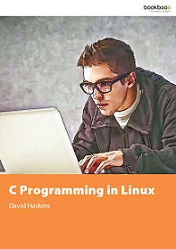
|
FreeComputerBooks.com
Links to Free Computer, Mathematics, Technical Books all over the World
|
|
- Title: C Programming in Linux
- Author(s) David Haskins
- Publisher: Bookboon.com
- Hardcover/Paperback: N/A
- ebook: PDF
- Language: English
- ISBN-10: N/A
- ISBN-13: 978-87-403-0543-2
- Share This:

|
This book will give you an interesting glimpse into a powerful lower-level world, using a series of web development examples. It explains how to write and compile C programs for the Linux operating system. The author introduces operators for manipulating C expressions, functions and structured programming, loop statements, numeric arrays, pointers, strings, memory management, and disk files.
Because the C language is like Latin - it is finite and has not changed for years. C is tight and spare, and in the current economic climate we will need a host of young people who know C to keep existing critical systems running.
C is built right into the core of Linux and Unix. The design idea behind Unix was to write an operating system in C so all you needed to port it to a new architecture was a C compiler. Linux is essentially the success story of a series of earlier attempts to make a PC version of Unix.
A knowledge of C is now and has been for years a pre-requisite for serious software professionals and with the recent popularity and maturity of Open Systems this is even more true. The terseness and perceived difficulty of C saw it being ousted from university teaching during the late 1990s in favour of Java but there is a growing feeling amongst some teaching communities that Java really is not such a good place to start beginners.
About the Authors- N/A
 Similar Books:
Similar Books:
-
 O'Reilly® Using C on the UNIX System (David A. Curry)
O'Reilly® Using C on the UNIX System (David A. Curry)
This book provides a thorough introduction to the UNIX system call libraries. It is aimed at programmers who already know C, but who want to take full advantage of the UNIX programming environment.
-
 Beej's Guide to C Programming (Brian Hall)
Beej's Guide to C Programming (Brian Hall)
This book introduces you to the most commonly used programming language, for computer users who would want to have an idea what is happening behind the scenes as they work with various computer programs.
-
 The Linux Kernel Module Programming Guide (Peter Salzman)
The Linux Kernel Module Programming Guide (Peter Salzman)
This book is an excellent guide for people who want to write kernel modules. It takes a hands-on approach starting with writing a small "hello, world" program, and quickly moves from there. Far from a boring text on programming,
-
 O'Reilly® Linux Device Drivers, 3rd Edition (Jonathan Corbet)
O'Reilly® Linux Device Drivers, 3rd Edition (Jonathan Corbet)
The 3rd edition of Linux Device Drivers is better than ever. The book covers all the significant changes to Version 2.6 of the Linux kernel, which simplifies many activities, and contains subtle new features.
-
 Programming in C - UNIX System Calls and Subroutines Using C
Programming in C - UNIX System Calls and Subroutines Using C
This book is guide to UNIX software development in C for professional programmers and students. It focuses on the UNIX system call interface - concentrates on a detailed study of the UNIX system call interface.
-
 Advanced Linux Programming (Mark L. Mitchell, et al)
Advanced Linux Programming (Mark L. Mitchell, et al)
This book focuses mostly on the Application Programming Interface (API) provided by the Linux kernel and the C library. It contains a preliminary introduction to the development tools available.
-
 Modern C (Jens Gustedt)
Modern C (Jens Gustedt)
Take your C programming skills to new heights, whether you're just starting out with C or have more extensive experience. Organized by level, this comprehensive guide lets you jump in where it suits you best while still reaping the maximum benefits.
-
 The Art and Craft of Programming, C Edition (John C. Lusth)
The Art and Craft of Programming, C Edition (John C. Lusth)
This book is designed to be used as the primary textbook in a college-level first course in computing. It takes a fairly traditional approach, emphasizing problem solving, design, and programming as the core skills of computer science.
-
 Object-Oriented Programming with ANSI-C (A. Schreiner)
Object-Oriented Programming with ANSI-C (A. Schreiner)
This book is not going to praise object-oriented programming or condemn the Old Way. It's simply going to use ANSI-C to discover how object-oriented programming is done, what its techniques are, why they help us solve bigger problems,
-
 A Book on C: Programming in C (Al Kelley, et al.)
A Book on C: Programming in C (Al Kelley, et al.)
The C language is demonstrated with numerous examples and extensive exercises that guide readers through each concept. Step-by-step "dissections" of program code reveal the underlying logic of the programs and include in-depth implementation details.
-
 Extreme C (Kamran Amini)
Extreme C (Kamran Amini)
This book will teach you to use C's advanced low-level power to write effective, efficient systems. This intensive, practical guide will help you become an expert C programmer. The book is essential for anybody who wants to take their C to the next level.
-
 Practical C (Mark Hharrison)
Practical C (Mark Hharrison)
This book is a collection of ideas and techniques written for both the newcomer to the C programming language and the experienced C programmer who wishes to get the most from an implementation of the language on a personal computer.





